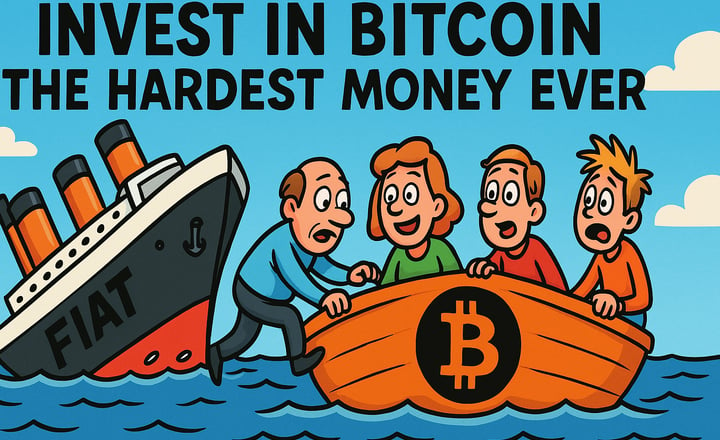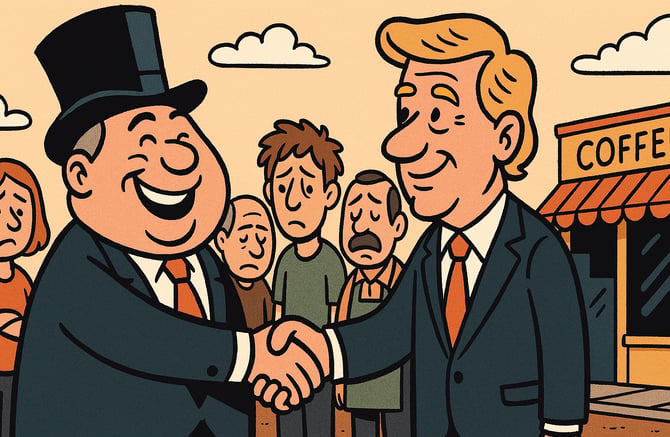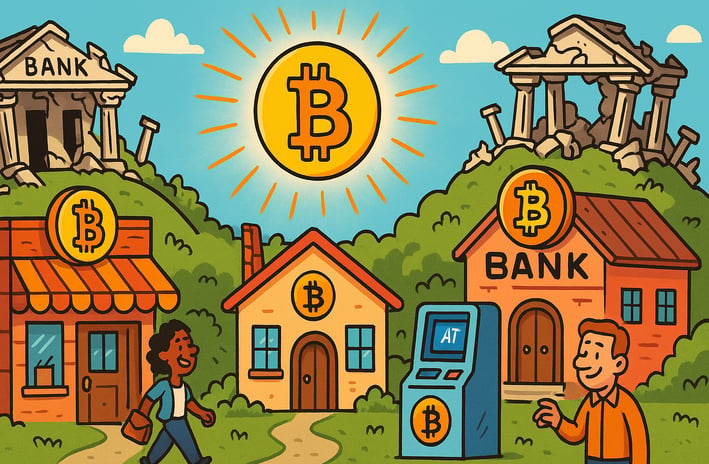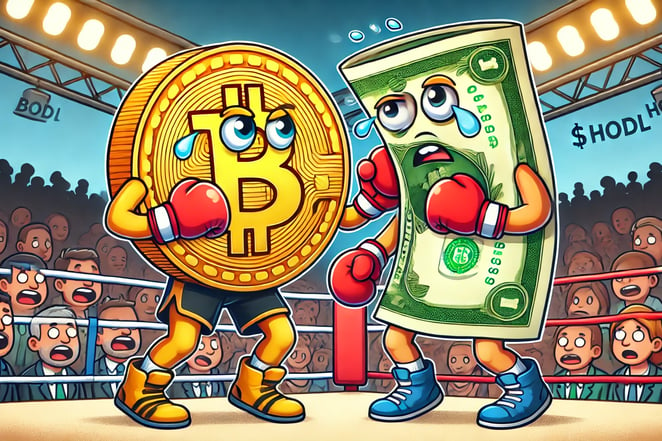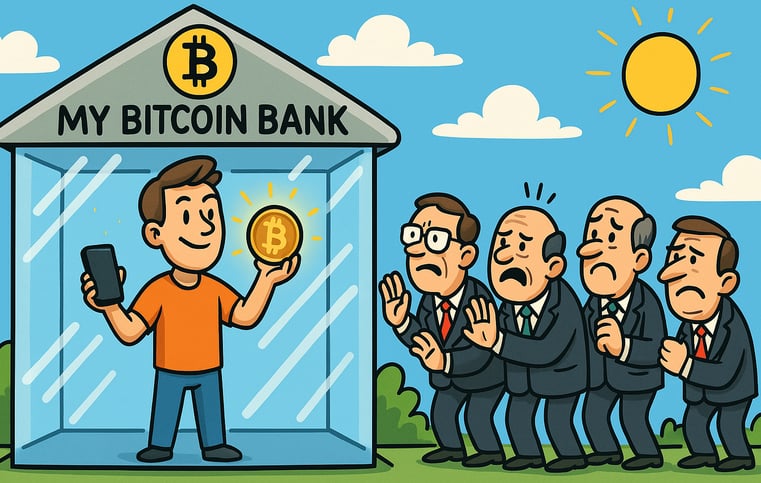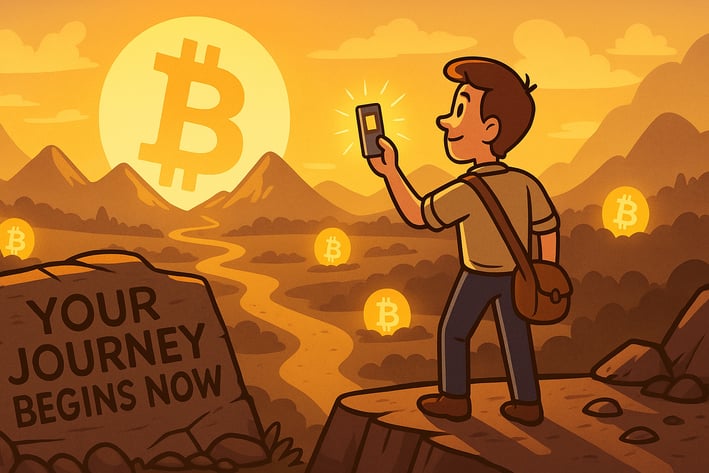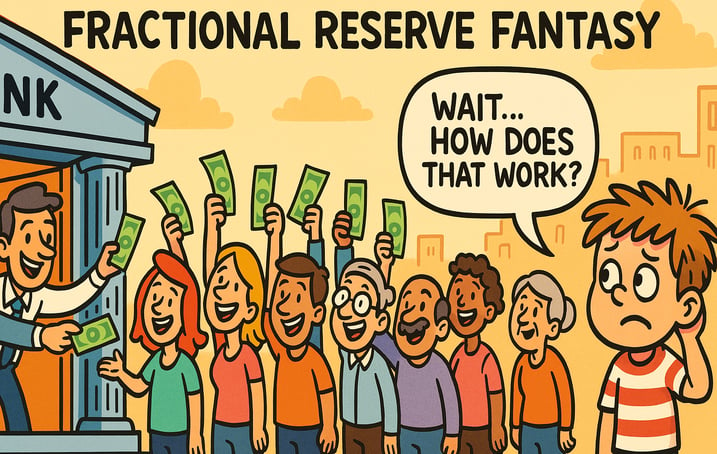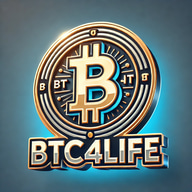Why Invest in Bitcoin
Ever wondered why billionaires and institutions are buying Bitcoin? BTC is more than a speculative asset—it’s the hardest money ever created. Find out why it's becoming the preferred store of value for the 21st century and beyond.
16 min read
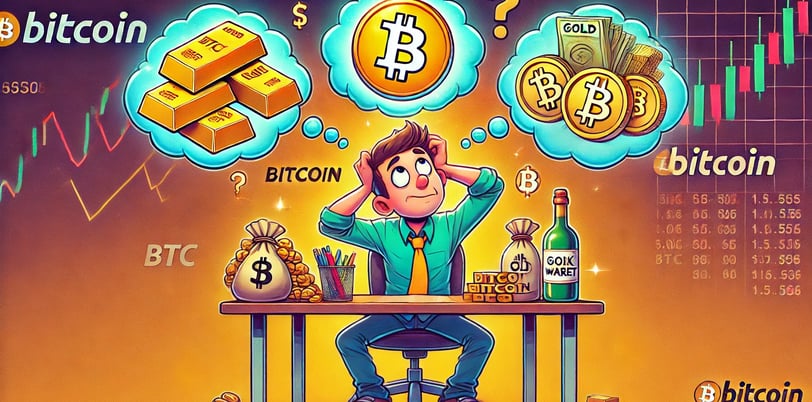

Invest in Bitcoin: The Hardest Money Ever
The world is waking up to a financial revolution. We've reached a point of no return with global debt exceeding $300 trillion—a figure that has become mathematically impossible to repay through productive economic activity. While central banks have printed more money in the last decade than in all previous history combined, a seismic shift is occurring: major economies are actively dumping U.S. Treasury holdings and accelerating dedollarization efforts. The dollar's seven-decade reign as the global reserve currency is crumbling under the weight of excessive money printing, weaponized SWIFT sanctions, and a coordinated move by BRICS+ nations to create a multipolar financial world.
In this chaos, Bitcoin emerges not merely as another digital asset, but as humanity's first true escape hatch from a failing monetary paradigm. Its fixed supply of 21 million coins stands as the antithesis to unlimited money printing, its decentralized nature defies weaponized banking, and its transparent protocol eliminates the need for trust in failing institutions. Bitcoin isn't just digital money—it's a lifeboat from a sinking financial ship, offering true sovereignty in a world of increasing monetary repression.
In this article, we'll explore why Bitcoin is the hardest money ever created, how it provides the solution to our broken financial system, and why it's positioned to become the world's premier reserve asset.
Note: "Fiat" money refers to government-issued currency that isn't backed by a physical commodity like gold. Instead, it derives its value solely from government decree (the Latin word 'fiat' means 'let it be done'). Examples include the US Dollar, Euro, and virtually all modern national currencies.
I. Why Our Money is Broken (And Why You Should Care)
Have you ever wondered why it feels harder and harder to get ahead financially, despite working just as hard? Let me show you what's really going on with our money.
The Hidden Tax Nobody Talks About
Technology naturally drives costs down. Every innovation lets us produce more with less – smartphones today pack more computing power than room-sized mainframes did, at a fraction of the cost. Manufacturing robots build better cars faster than ever, while modern farming feeds more people with less land and labor. This is technology's inherent deflationary effect: it creates abundance and should make everything progressively cheaper.
Yet our financial reality tells the opposite story. In 1970, a new car cost $3,500 and the average house was $23,450, with median household incomes at $9,870. Today, that same car costs $40,000 and houses exceed $400,000, while median income has only reached $70,000. The math is stark: prices have multiplied 10-15 times, but wages barely 7 times. Your grandparents could buy a house with 2.4 years of income; now it takes over 6 years.
This contradiction exposes a fundamental problem: while technology pushes costs down, our monetary system pulls prices up. The natural deflationary benefits of innovation are being overwhelmed by inflationary monetary policy. When central banks create new money through "quantitative easing," they're diluting the value of every existing dollar – like adding water to juice. This inflation acts as a hidden tax, steadily eroding your purchasing power and preventing society from reaping the full benefits of technological progress.
The Ultimate Ponzi Scheme
Here's where it gets really interesting – and disturbing. Our entire monetary system is essentially a sophisticated Ponzi scheme. When you take out a loan, the bank creates new money out of thin air. You have to pay back the loan PLUS interest. But here's the catch – where does the money to pay the interest come from? It doesn't exist yet! The only way to pay all the interest in the system is to create MORE new money through more loans.
Think about it: If all loans were paid back today, there wouldn't be enough money in existence to pay all the interest. The system literally requires ever-increasing debt just to keep running. Stop creating new debt, and the whole thing collapses. Sound familiar? That's exactly how a Ponzi scheme works – it needs constant new money to pay existing obligations.
Central Planning: Communist Economics in Disguise
Here's a question that might surprise you: What's the difference between Soviet central planners deciding how much wheat to produce at what price vs central bankers deciding how much money should exist and at what price (interest rate)?
The answer? Not much.
In a free market, prices and production are determined by voluntary exchanges between millions of people making their own decisions. No central authority decides how many smartphones Apple should make – the market figures it out through supply and demand.
But when it comes to money – arguably the most important good in the economy – we've accepted complete central planning. A small committee at the central bank decides how much money should exist, what interest rates should be, which banks get bailed out, and who gets access to new money first.
This isn't capitalism – it's monetary communism. And like all centrally planned systems, it fails to respond to real market needs – and goes broke eventually.
The Velocity Problem
Central bankers love to talk about controlling the "money supply," but here's what they don't mention: they have zero control over how quickly money moves through the economy (what economists call "velocity").
Think of it this way: Printing $1 trillion doesn't help if it all sits in Wall Street bank accounts. What Main Street needs is money actually circulating through the economy – being spent at local businesses, paying workers, funding real economic activity.
This is why we often see a "booming" stock market alongside struggling small businesses. All that new money goes to banks and large corporations first, where much of it stays, inflating asset prices rather than helping real economic activity. Meanwhile, your local coffee shop can't get a loan, and workers' wages stay flat.
The Financial-Political Complex
What we're witnessing today is perhaps the most dangerous separation in economic history – the divorce between the financial system and the real economy. But this divorce came with a toxic marriage: the fusion of finance and political power.
Back in the 1970s, the financial sector accounted for about 15% of all corporate profits in America. Today, that number has swelled beyond 30%. This might sound like mere statistics, but it reveals something profound about our economy. The financial sector – which produces no tangible goods, builds no houses, grows no food, invents no technologies – now captures a third of all corporate profits in our economy.
This shift represents a fundamental perversion of finance's role. Banking was once a service industry, like plumbing or electrical work, designed to support businesses that actually produce things. A healthy financial system should be like a healthy circulatory system – moving resources to where they're needed most, facilitating trade and enterprise. Instead, it has become more like a tumor, growing at the expense of the host.
Look around and you'll see the consequences everywhere. Major corporations now spend more money on stock buybacks than on research and development. The brightest mathematical minds of our generation aren't solving climate change or curing diseases – they're designing high-frequency trading algorithms. Banks would rather lend money for speculative trading than to small businesses looking to expand. The financial tail is now wagging the economic dog.
But the real cancer is how thoroughly finance has captured our political system. The line between Wall Street and Washington has become so blurred it's practically invisible. Watch the revolving door spin: banking executives become government regulators, then return to even cushier private sector jobs. Treasury officials craft policies that benefit their former (and future) employers. Central bankers move seamlessly between the Federal Reserve and private equity firms. Each turn of this door further erodes the boundary between public service and private gain.
This isn't just corruption in the traditional sense – it's something more insidious. The financial industry has convinced us that what's good for Wall Street is good for America. When banks fail, we're told they must be saved to protect the economy. When regulations are proposed, we're warned they'll hurt economic growth. When markets dip, central banks rush to the rescue. But when working families struggle? When small businesses fail? When wages stagnate? The response is always the same: that's just the market at work.
The result is a system where financial interests don't just influence policy – they define what's possible. Want to regulate banks more strictly? The market will tank. Want to help ordinary people instead of banks? Watch bond yields spike. Want to challenge the power of financial institutions? Prepare for an economic crisis. The mere threat of market disapproval is enough to veto policies that might benefit the broader public.
This marriage of financial and political power creates a self-reinforcing cycle. Banks use their economic power to gain political influence, which they use to increase their economic power, which buys them even more political influence. Meanwhile, the real economy – the one where things are actually built, invented, and created – increasingly serves the financial sector rather than the other way around.
The consequences reach far beyond economics. When finance dominates both the economy and politics, democracy itself begins to hollow out. Voters may choose their representatives, but increasingly find that the real decisions are made in response to market pressures rather than public needs. We're left with a system that maintains the appearance of democratic capitalism while functioning more like a financial oligarchy.
The Fractional Reserve Fantasy
"Your money is safe in the bank" – that's what they tell us. But here's the uncomfortable truth: when you deposit $100, the bank only keeps a fraction of it at the central bank. The rest? They loan it out, multiple times over. This "fractional reserve" system means banks are essentially creating money from your deposits.
When you understand this, you realize it's fundamentally dishonest – multiple people have claims to the same money. It's inherently unstable – if too many people want their money at once, the bank fails. And it amplifies economic cycles – banks create too much money in good times and too little in bad times.
Remember 2008 or 2023's bank failures? That's what happens when this house of cards starts to wobble. And every time it does, guess who gets bailed out (banks) and who pays for it (you)?
Short-Term Thinking and Perverse Incentives
When your money loses value every year, it fundamentally changes how people behave. Your grandparents could put money in a savings account earning 5% interest and actually preserve their wealth. Today? With 2% interest rates and 6%+ inflation, keeping money in the bank guarantees you'll get poorer every year. This forces people to become unwilling speculators just to preserve their wealth.
To escape inflation, people are pushed into increasingly problematic "inflation hedges." Everyone piles into real estate, driving up prices and making homes unaffordable. Real estate is illiquid, has high transaction costs, requires maintenance, comes with property taxes, and often needs leverage to buy. Stock trading has become another de facto savings vehicle. However, it carries significant risks: insider advantages favor institutional players, market mechanics remain opaque to retail investors, proper portfolio management requires specialized knowledge, and valuations often disconnect from underlying business fundamentals. Some turn to art, collectibles, or wine – buying things they don't even want just to store value, dealing with storage costs, authentication concerns, and limited liquidity.
The system encourages immediate consumption over saving. Why save money that's guaranteed to lose value? Better to buy now before prices go up. Credit cards and easy loans encourage debt-fueled spending. Fear of missing out drives speculative bubbles.
This creates a society where people live paycheck to paycheck not by choice but necessity. Saving for the future becomes nearly impossible. Everyone is forced to become a speculator. Real wealth-building becomes increasingly difficult for regular people. The focus shifts from producing value to chasing returns.
The New Feudalism: Exploitation by Design
Here's the most disturbing part: this system is creating a new form of feudalism, where the gap between the financial elite and everyone else grows wider every year. When new money is created, it doesn't reach everyone at the same time. It goes to banks and big corporations first, who can buy assets before prices rise. By the time it reaches regular people, inflation has eaten its value. This is called the Cantillon Effect, and it's a designed feature, not a bug.
Every transaction you make through the banking system is tracked, recorded, and analyzed. Your money isn't really yours – try withdrawing a large amount and watch how quickly you're treated with suspicion. Big players get near-zero interest rates, bailouts when they fail, and first access to new money. Regular people get high consumer interest rates, no bailouts, and inflation-degraded savings.
Banks and governments can freeze your accounts, block your transactions, or cut you off from the financial system entirely. This isn't just about money – it's about power and control. Want to protest government policies? They can freeze your accounts. Want to support a cause they don't like? They can block your transactions.
The Breaking Point
We're reaching a critical moment. The system requires ever-increasing debt, continuous money printing, complete surveillance, and absolute trust in central authorities. But people are losing faith. They're seeing their savings evaporate, their wages stagnate, and their financial freedom erode. They're watching as the system increasingly serves the few at the expense of the many.
This is why Bitcoin matters. It's not just about making money or speculating on price. It's about fixing a fundamentally broken system. In the next chapter, we'll explore how Bitcoin offers an alternative – a system based on mathematical certainty instead of human promises, voluntary participation instead of coercion, true ownership instead of surveillance, and fixed supply instead of endless printing.
Because once you understand how broken our current money is, the need for an alternative becomes obvious. The question isn't whether we need a better system – it's whether we'll have the courage to embrace one.
II. The Bitcoin Solution
Bitcoin is not just money—it's an entirely new financial system that includes software and hardware infrastructure. It's an alternative to the central bank-based system, one that is decentralized, transparent, and open to everyone. Here's how Bitcoin solves the problems above:
1. A Truly Free Market
Bitcoin operates on a decentralized network with no central authority. It's a system "run by the people, for the people." Anyone can participate—not just accredited investors or insiders. This is real democracy in action. Bitcoin embodies the principles of free markets, where supply and demand dictate value, not central planners.
2. A Trustless, Transparent System – Don’t Trust, Verify!
Bitcoin eliminates the need to trust third party entities. Transactions are verified by a global network of nodes and miners, not by banks or governments. The blockchain—a public ledger—ensures complete transparency so anyone can verify transactions and balances. Say goodbye to corrupt auditing practices!
3. Decentralization: Power to the People
Bitcoin is extremely decentralized: no single entity could ever take control over. It's a system that can't be corrupted, censored, or manipulated. Compare this to gold, which, while physically decentralized in nature, is often stored in centralized vaults and controlled by a few institutions.
4. Scarcity: The Hardest Money Ever
Bitcoin has a fixed supply of 21 million coins—forever. This absolute scarcity makes it immune to inflation. Gold, while scarce, is still mined every year, increasing its supply. And higher price comes with more inflation. Fiat, on the other hand, is printed endlessly, eroding its value over time. Bitcoin is the only form of money with a mathematically guaranteed supply cap.
5. Incentives for Honest Behavior
The Bitcoin network aligns incentives for all participants to play honest. Miners are rewarded for securing the network with energy, users benefit from a transparent system, and developers contribute to an open-source protocol that benefits everyone. This creates a virtuous cycle of cooperation rather than exploitation.
6. Long-Term Thinking
Bitcoin encourages saving and long-term planning. Its fixed supply and deflationary nature incentivize people to think about the future rather than consume mindlessly today. This leads to more sustainable economic behavior and better capital allocation.
Understanding Monetary Properties
To understand why Bitcoin is the hardest money ever created, let's first examine the traditional properties that make good money:
1. Classical Monetary Properties
- Scarcity: The money supply must be limited to maintain value
- Portability: Money should be easy to transport and transfer
- Divisibility: It should be divisible into smaller units for flexible use
- Durability: Money must withstand time and use without degrading
- Verifiability: It should be easy to authenticate and difficult to counterfeit
- Acceptability: People must be willing to accept it as a medium of exchange
2. Revolutionary New Properties Enabled by Bitcoin's Technology
- Decentralization (Peer-to-Peer): No central authority controls the network
- Inflation Resistance: Absolute scarcity of 21 million coins
- Censorship Resistance: No single point of failure
- Trustless: Relies on mathematical proof, not human trust
- Permissionless: Anyone can use Bitcoin without approval
- Borderless: Functions identically anywhere in the world
3. Bitcoin vs. Fiat and Gold: The Ultimate Comparison
Bitcoin combines the best properties of both fiat and gold while eliminating their weaknesses, and provides extra new features never even dreamt of before. It's as portable as digital fiat but with the scarcity of gold. Unlike fiat, it can't be printed at will. Unlike gold, it can be instantly transferred anywhere in the world and easily verified. It's the first form of money that is truly sovereign—controlled by no one and accessible to everyone.
Bitcoin: A System Built for Freedom
Bitcoin isn't just a currency—it's an infrastructure for financial freedom. Here's what it offers for all – including YOU!
1. Be Your Own Bank (BYOB)
Bitcoin allows you to take full control of your finances. You can store, send, and receive money without needing a bank. But it goes further: Bitcoin enables the use of decentralized finance (DeFi), where you can lend, earn interest, and even access interest-free loans—all without a bank's approval and cost margin. You become your own bank!
This is real financial sovereignty!
2. Permissionless Access
Anyone with an internet connection can use Bitcoin. No bank account required, no credit check needed, no government permission necessary. No restrictions or frozen accounts. This is especially powerful for the billions of unbanked people worldwide.
3. The Safest Asset
FINANCIAL SOVEREIGNTY - THE ONLY ASSET YOU TRULY OWN AND NOBODY CAN TAKE IT FROM YOU!
Bitcoin represents unprecedented asset security when properly managed. Unlike traditional financial assets, Bitcoin gives you true ownership through private keys—not just an IOU from a bank or broker. No one can freeze your account, deny access, or confiscate your wealth. With proper security practices (hardware wallets, seed phrase backups, multi-signature setups), your Bitcoin is virtually impossible to steal. Banks can go bankrupt, gold and land can be seized, accounts can be frozen, but Bitcoin secured with a properly stored private key is untouchable. Even governments cannot confiscate it through direct force—they would need your voluntary cooperation to access it. This "unseizable" property makes Bitcoin unique in human history: it's the first asset that can be stored entirely in your mind (through a memorized seed phrase), carried across borders without detection, and restored anywhere in the world. In times of crisis—whether personal (divorce, lawsuits), national (bank failures, capital controls), or global (war, persecution)—Bitcoin provides an unmatched level of asset security and financial sovereignty. BTC IS THE ULTIMATE RESERVE ASSET!
4. A Better World
Bitcoin creates a fairer economic system. It eliminates the privileged position of banks and governments in the monetary system. It rewards productivity and innovation rather than political connections. It promotes peace by making war financing through inflation impossible.
Recommended Watch: For a comprehensive visual explanation of how Bitcoin can transform our world for the better, watch this video with attention. 40 minutes long but worth every seconds!
Why Bitcoin's Price Will Keep Rising
1. Fiat Has No Bottom, Bitcoin Has No Top
As central banks endlessly print money, fiat currencies are in a race to the bottom—just look at the US dollar, which has lost over 85% of its purchasing power since 1971 and more than 97% since the FED was established in 1913. Bitcoin, on the other hand, is mathematically capped at 21 million. And a portion of each new fiat supply will find its ways to Bitcoin. This isn’t just Bitcoin going up in price—it’s fiat currencies collapsing when measured against the hardest asset ever created. The more they print, the more inevitable Bitcoin's rise becomes. This is not speculation—it’s basic economics!
2. Bitcoin is positioned to become the world's premier reserve asset
Traditional reserve assets all have significant drawbacks:
Fiat Currency: Loses purchasing power through inflation, making it a poor store of value
Real Estate: Illiquid, requires maintenance, carries tenant risks, property taxes, natural disaster risks, and can't be easily moved or divided
Stocks: Subject to company competition, management decisions, market cycles, and geopolitical risks
Art: Highly illiquid, requires expensive storage, authentication, and preservation
Gold: Costly to store securely, difficult to transport, hard to verify, and not easily divisible
Until Bitcoin, there was no perfect savings vehicle. This forced people and businesses to store value in these suboptimal assets, leading to market distortions, asset bubbles, misallocation of capital and inefficient use of resources.
Just imagine how the price could surge once capital from traditional reserve assets begins flowing into Bitcoin!
III. Conclusion: A New Era of Financial Sovereignty - Your Journey Begins Now
The transition to Bitcoin represents more than a financial decision—it's a fundamental shift in how we think about money, freedom, and personal responsibility. This journey requires a new mindset and a commitment to personal growth.
Education: Your Most Powerful Tool
Understanding Bitcoin is your first and most crucial investment. The technology is revolutionary, but with great power comes great responsibility. Your journey doesn't end with buying Bitcoin—it begins there. To navigate this new financial frontier safely, you'll need to master self-custody of your assets, implement robust digital security practices, understand the fundamentals of decentralized finance protocols, maintain financial privacy, engage with the community for continuous learning, and develop sound risk management strategies. Think of it as learning to be your own bank—the tools are powerful, but they require knowledge to use effectively and safely.
Freedom Demands Responsibility
Becoming your own bank means taking full responsibility for your financial sovereignty:
- Security management becomes your duty
- Privacy becomes your priority
- Critical thinking becomes essential
- Continuous learning becomes a way of life
This responsibility is the price of true financial freedom. But it's a price worth paying.
A New Approach to Life
Bitcoin isn't just changing money—it's changing how we think and live:
- From short-term to long-term thinking
- From dependency to self-reliance
- From trust in institutions to trust in mathematics
- From passive acceptance to active participation
- From seeking permission to taking initiative
Time For Action
Understanding is nothing without action. Ready to take your first steps?
→ Continue to our comprehensive guide: "How to Invest in Bitcoin" [link]
This guide will walk you through:
- Choosing secure exchanges
- Setting up proper storage
- Implementing security best practices
- Creating your personal Bitcoin strategy
Final Thoughts
Bitcoin is here to stay. The writing is on the wall. You can’t change Bitcoin, but it will change you. Your future self is watching. Make your move!
And don't forget to watch this video for a deeper understanding!
